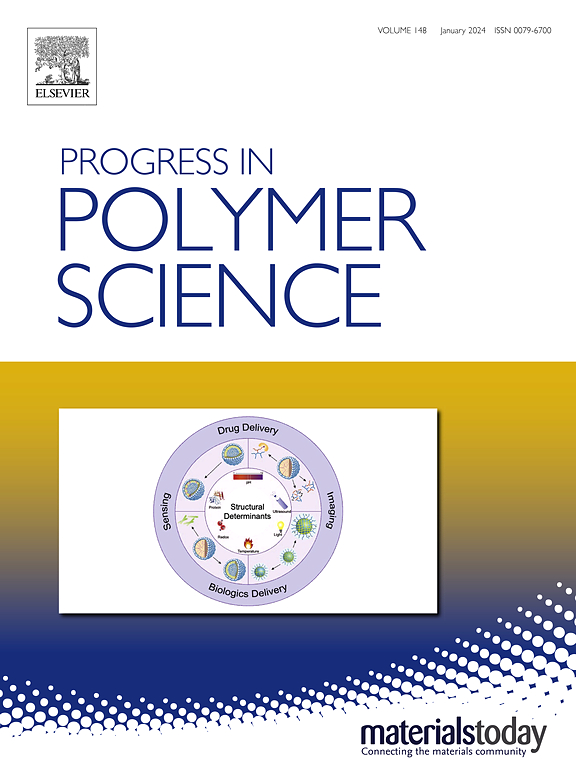一步杂化嵌段共聚的有机催化
IF 26.1
1区 化学
Q1 POLYMER SCIENCE
引用次数: 0
摘要
杂化嵌段共聚物由两个或多个具有不同主链组成和物理化学性质的聚合物段组成,由于其经常增强的自组装和微相分离的倾向而获得了广泛的关注。用于合成这种嵌段共聚物的理想方法包括从一个引发剂自发地顺序或同时聚合具有不同可聚合基团的混合单体。然而,主要的挑战往往是对双催化剂-单体适用性和/或两种机制不同聚合的相容性的严格要求。幸运的是,近年来,无有机/金属催化聚合技术取得了快速进展,培养了多种有效的策略来实现混合单体的序列选择性共聚和一步控制合成杂化嵌段共聚物。本文综述了杂环化合物的有机催化一步嵌段共聚的最新进展,其中也包括乙烯基单体。我们还简要概述了关键反应机制,解决了当前的局限性,并提出了一步嵌段共聚物合成的未来方向。本文章由计算机程序翻译,如有差异,请以英文原文为准。


One-step hybrid block copolymerization by organocatalysis
Hybrid block copolymers, comprising two or more polymer segments with distinct main-chain compositions and physicochemical properties, have garnered profound interests due to their often-fortified propensities for self-assembly and microphase separation. An ideal approach for synthesizing such a block copolymer comprises spontaneously sequential or simultaneous polymerizations of mixed monomers, bearing different polymerizable groups, from one initiator. However, major challenges are frequently posed by the stringent requirements for dual catalyst-monomer suitability and/or the compatibility of two mechanistically distinct polymerizations. Fortunately, recent years have witnessed rapid progress in organo-/metal-free catalytic polymerization techniques, cultivating a diversity of effective strategies for achieving sequence-selective copolymerization of mixed monomers and one-step controlled synthesis of hybrid block copolymers. We aim to summarize here the recent advances in one-step block copolymerization of heterocycles by organocatalysis, with also vinyl monomers involved in plenty of cases. We also provide a brief overview of the critical reaction mechanisms, address current limitations, and suggest future directions for one-step block copolymer synthesis.
求助全文
通过发布文献求助,成功后即可免费获取论文全文。
去求助
来源期刊

Progress in Polymer Science
化学-高分子科学
CiteScore
48.70
自引率
1.10%
发文量
54
审稿时长
38 days
期刊介绍:
Progress in Polymer Science is a journal that publishes state-of-the-art overview articles in the field of polymer science and engineering. These articles are written by internationally recognized authorities in the discipline, making it a valuable resource for staying up-to-date with the latest developments in this rapidly growing field.
The journal serves as a link between original articles, innovations published in patents, and the most current knowledge of technology. It covers a wide range of topics within the traditional fields of polymer science, including chemistry, physics, and engineering involving polymers. Additionally, it explores interdisciplinary developing fields such as functional and specialty polymers, biomaterials, polymers in drug delivery, polymers in electronic applications, composites, conducting polymers, liquid crystalline materials, and the interphases between polymers and ceramics. The journal also highlights new fabrication techniques that are making significant contributions to the field.
The subject areas covered by Progress in Polymer Science include biomaterials, materials chemistry, organic chemistry, polymers and plastics, surfaces, coatings and films, and nanotechnology. The journal is indexed and abstracted in various databases, including Materials Science Citation Index, Chemical Abstracts, Engineering Index, Current Contents, FIZ Karlsruhe, Scopus, and INSPEC.
 求助内容:
求助内容: 应助结果提醒方式:
应助结果提醒方式:


